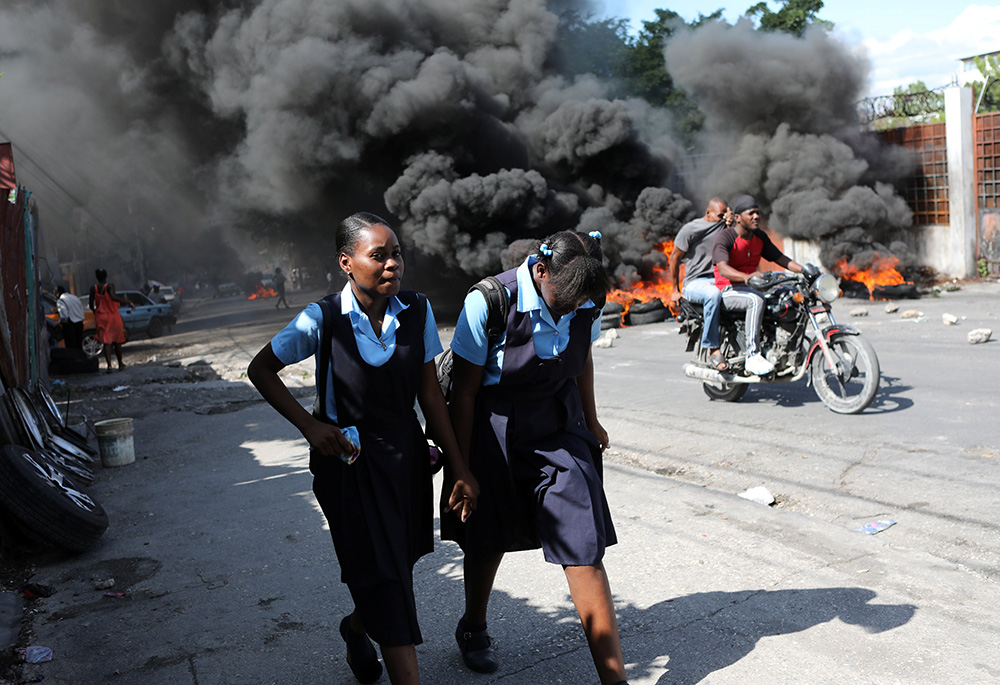
Schoolgirls walk past a burning street barricade during demonstrations Nov. 25, 2021, against widespread kidnappings in Port-au-Prince, Haiti. (CNS/Reuters/Ralph Tedy Erol)
Two telling anecdotes illustrate the grim reality of life in Haiti as the country enters 2022.
On a recent Saturday in the capital city of Port-au-Prince, a group of people desperate for food opted not to come to a church-run food distribution site because they knew they risked being kidnapped or murdered on the way.
"Imagine choosing, 'Should I eat or should I risk my life for food?' Clearly we would all choose the same thing, but that's astounding," said Dawn Colapietro, a lay missionary for the Sisters of Charity of St. Elizabeth in New Jersey who has long experience working in Haiti and heard the anecdote from a woman working at the center.
Colapietro recounts a related story from a trusted colleague about a Haitian priest who never much liked breakfast but now eats "a hearty breakfast every day because he knows that if he gets kidnapped that day, that it will be the last meal he will eat for several days," she said. "It's that change of mindset which shows how things have changed fundamentally in Haiti."
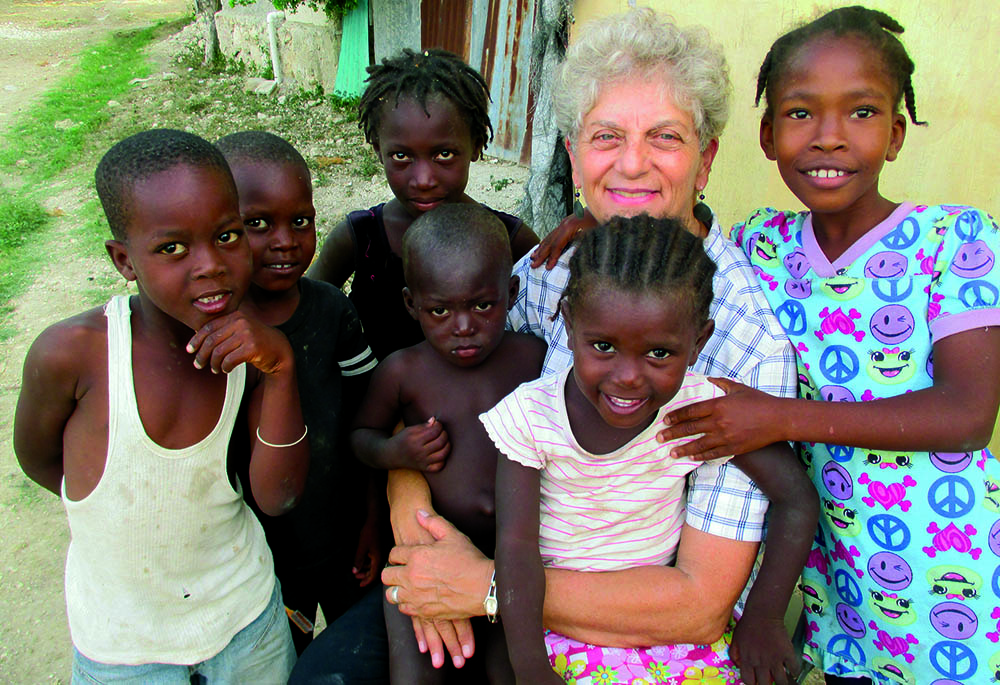
Dawn Colapietro, a lay missionary with the Sisters of Charity of St. Elizabeth, at a school in Cuvier, just east of Haiti's capital of Port-au-Prince. (Courtesy of Dawn Colapietro)
Already tormented by a year which included another major earthquake (and followed immediately by a tropical storm that nearly reached hurricane-like strength), the assassination of President Jovenel Moïse, a worsening security situation and the reality of the COVID-19 pandemic, Haiti enters 2022 facing formidable political, economic and social challenges.
Catholic sisters and humanitarian workers, both Haitian and non-Haitian, describe the challenges as daunting.
"I think one day we will get out of it," said Sr. Denise Desil, the mother general of Haiti's Little Sisters of St. Thérèse of the Child Jesus, a Haiti-based congregation. "But for now, it is very, very difficult, this current situation."
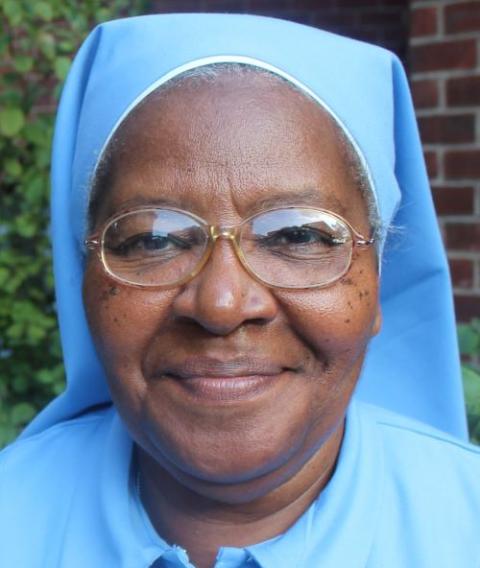
Sr. Denise Desil of the Little Sisters of St. Thérèse of the Child Jesus in Haiti (GSR file photo)
While hesitant about describing specifics, Desil said "not being free" to travel easily has impeded, and in some cases fully halted her congregation's medical and educational ministries. "We're living in a lot of stress right now," she said. Her congregation's ministries in areas affected by the August 2021 earthquake have also effectively stopped and sisters working there continue to live in tents five months after the disaster.
"From the perspective of the Haitian people, it can feel like a death spiral, like there is no way out of it," said Sr. Marilyn Lacey, executive director of the international nonprofit Mercy Beyond Borders, describing what she hears from Haitian colleagues. "How much misery can one country absorb? It's discouraging."
In interviews earlier this month, Lacey, Desil, Colapietro and others involved in religious or humanitarian work say that they have to look beyond current discouragements and challenges in the hope of that their ministries are planting seeds for the future — a future, they say, in which security improves; some form of good governance takes root; and today's young Haitians, particularly women and girls, build on efforts to improve lives and end endemic corruption and dependence on outside humanitarian efforts.
"We continue to be inspired by the resilience of the young women we work with," Lacey said of the work of Mercy Without Borders. It is ultimately up to Haitians to chart their own destiny, she said, with hopes that women in particular will take on an increased role in creating a better future. "We [outsiders] are there to work ourselves out of a job."
But Lacey and others acknowledge that the hope, particularly of women helping to chart a more promising future for Haiti, is years, if not generations, away.
For now, the challenges of security are paramount and immensely difficult to overcome.
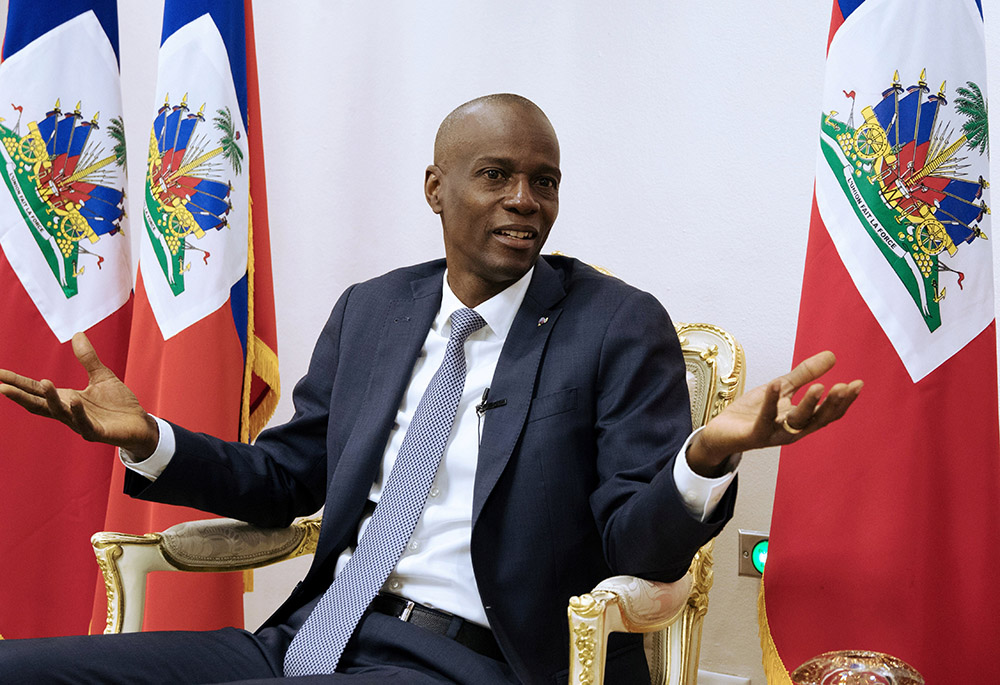
Haitian President Jovenel Moïse is pictured in a Jan. 11, 2020, photo. The president was assassinated in an attack in the early hours of July 7, 2021, at his home outside of the capital, Port-au-Prince. (CNS/Reuters/Valerie Baeriswyl)
"This is an emergency," said a Haitian humanitarian worker who works with the Sisters of Charity in Port-au-Prince but because of the current situation does not want to be identified publicly.
"If we want to solve any other problem, we have to start from there — from the issue of security," the worker said. "If the president of Haiti could be killed inside of his home, no one is safe."
"The security threat is growing and it's a major concern," said Akim Kikonda, Catholic Relief Services' country representative in Haiti, who heads a humanitarian operation that has had to find new ways to get needed supplies for its ongoing earthquake-related response from Port-au-Prince to parts of southern Haiti still recovering after the August earthquake.
Shipments by barges run by the United Nations' World Food Program, Kikonda said, are helping Catholic Relief Services get around the problem of blocked roads, as are inter-city flights for CRS staff on WFP planes.
"It's frustrating. When I travel south [in Haiti] I see the needs."
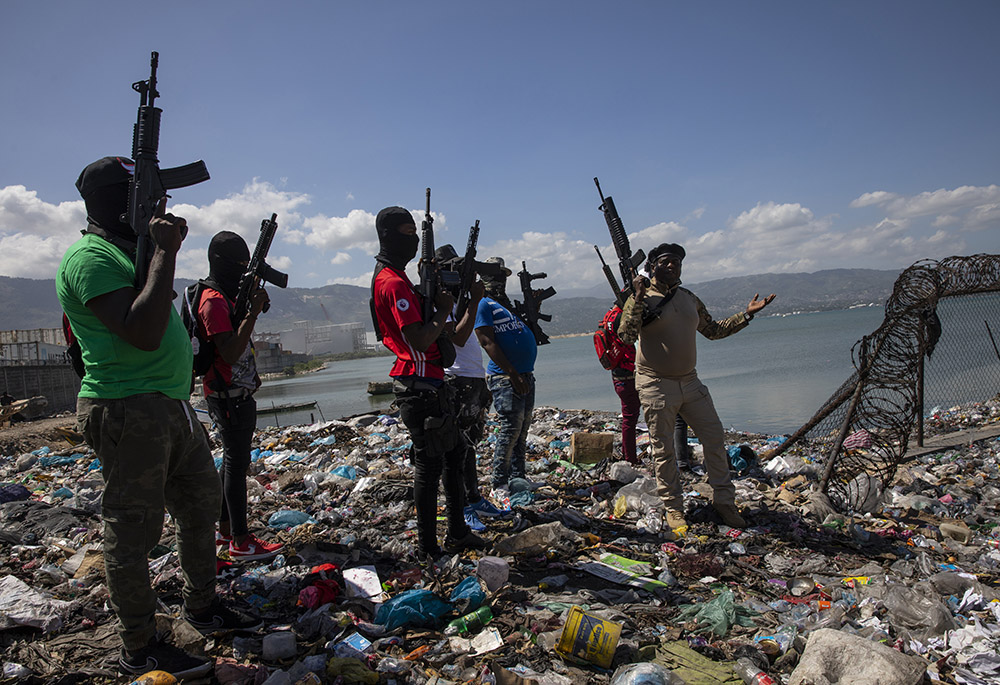
Flanked by members of the G9 gang coalition, leader Jimmy Cherizier, aka Barbecue, right, talks to reporters near the perimeter wall that encloses Terminal Varreux, the port owned by the Mevs family, in Port-au-Prince, Haiti, in October 2021. Barbecue, a former policeman, sees himself as a man of the people and an enemy of the elite. (AP photo/Rodrigo Abd)
Gangs and politicians
The needs are grounded in so many problems.
At the center of concern is the dominance of gangs which have essentially taken control of the country's urban centers, particularly the crowded capital, Port-au-Prince, home to about 1.5 million people.
Nearly 100 gangs are fighting over territory in the capital, with at least 19,100 people displaced, New York-based Human Rights Watch said in its most recent country report about Haiti.
Violence is escalating, the human rights monitoring group said, noting that the United Nations Integrated Office in Haiti (BINUH) reported 1,074 intentional homicides and 328 kidnappings in the first eight months of 2021. "Intentional homicides increased by 14 per cent, compared with 944 cases in the same period of 2020, and kidnappings continued to rise, compared with 234 for all of 2020," the group reported.
Complicating the issue is that "Haitian civil society groups say insecurity is exacerbated by alleged complicity between politicians and gangs," Human Rights Watch said.
As reported by the Guardian newspaper in October 2021, gangs control about half of the capital. Quoting a 2020 report by the National Human Rights Defense Network, the Guardian noted that "organizations led by armed bandits regularly receive from the private business sector as well as the authorities in power, exorbitant amounts or large amounts of equipment for interventions for the benefit of people in difficulty."
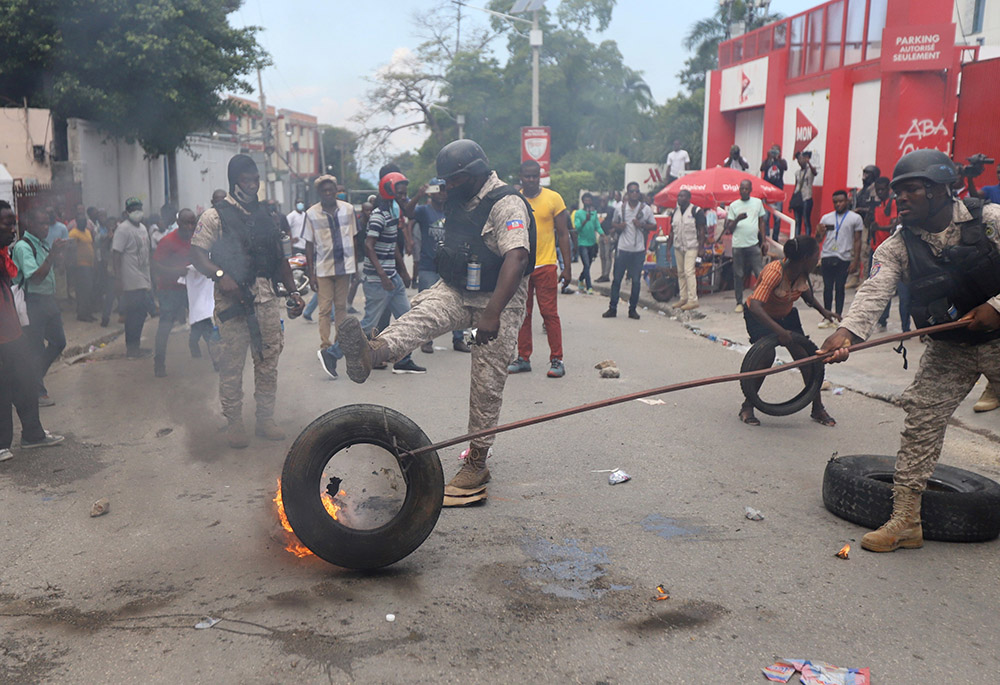
Police in Port-au-Prince, Haiti, remove a burning tire Oct. 18, 2021, as people mount a nationwide strike to protest a growing wave of kidnappings. (CNS/Reuters/Ralph Tedy Erol)
Harvard Law School's International Human Rights Clinic and the Haiti-based human rights watchdog coalition Observatoire Haïtien des Crimes contre l'humanité, concluded in a report last year that there was clear evidence of complicity between gangs and the government of President Moïse.
According to the clinic, "The report points to evidence that gang-led attacks were resourced and supported by state actors, ranging from high-ranking officials in the Moïse administration to the Haitian National Police."
One interpretation of events in Haiti comes from French researcher Djems Olivier who wrote that nongovernmental organizations "try to remedy the shortcomings of the state through projects financed by international donors, while the armed gangs, following a survival logic, ensure the distribution of food rations to poor families and organize sports and sociocultural activities."
"This co-management strategy," Olivier argued in a 2021 article published by the North American Congress on Latin America, or NACLA, "contributes to territorial fragmentation whereby an archipelago of neighborhoods ends up beyond the control of the central state and local authorities, who become figure heads."
Advertisement
Another interpretation is that in a political void — with no sitting president or parliament at the moment — Haitian politicians are using gangs to control neighborhoods and try to buy loyalty from urban residents, observers say.
"I can't tell you why the rich or those in government are supporting the gangs," Desil said. "But I can say it's not good, it's not good."
To Colapietro, the dynamics are not surprising.
"If you have a country absent of government and infiltrated with corruption and then you have an economy that can't provide jobs and support a family," she said, "this is just a breeding ground for young people to identify with a group that will empower them, provide them with authority and to give them food for their family."
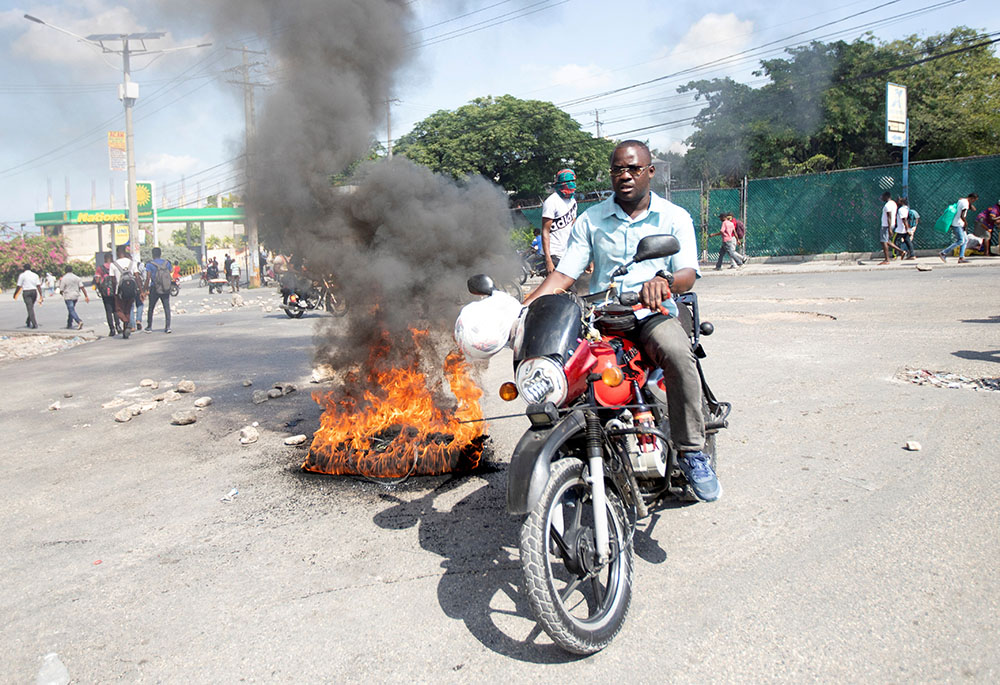
A man in Port-au-Prince, Haiti, drives his motorcycle past a burning barricade Oct. 20, 2021, as demonstrators take part in a protest against high prices and fuel shortages. (CNS/Reuters/Ralph Tedy Erol)
Compounding the security situation is the pandemic. With no sitting government and no national campaigns for vaccinations against COVID-19 underway, and with long-standing suspicion of previous government-run health efforts against other health challenges, vaccinations are not underway, said the Haitian humanitarian worker who works with the Sisters of Charity.
"There is the issue of trust. I have the sense that the population doesn't really trust the government," the worker said. "If anything is connected to the government, they don't really take it seriously."
Numbers bear that out; though vaccines are available in the country, data show that only 1 percent of Haitians have received one dose of the vaccine and less than 1 percent have been fully vaccinated.
It is not really known how many people may be sick or dying from COVID-19, but given the lack of attention to the problem, the country is likely to face an increasingly dire situation in the coming months, said Kikonda of CRS. "People are getting sick and people are dying."
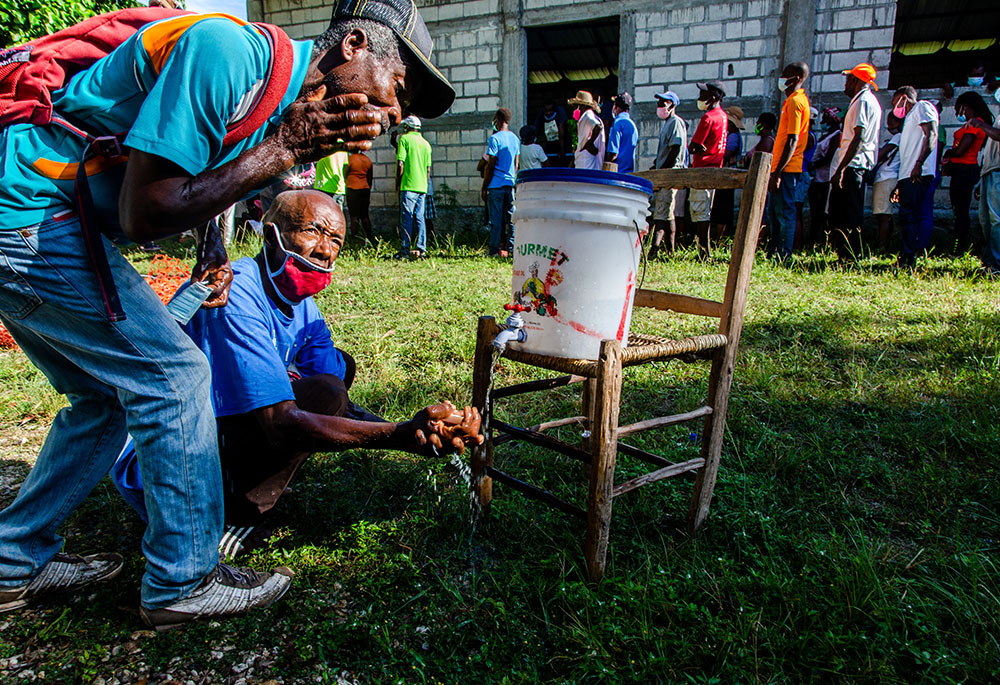
Haitians affected by the August 2021 earthquake in southern Haiti are seen in September at a Catholic Relief Services distribution site in the locality of Kay Raymond, Petit-Trou-de-Nippes, Haiti. (Catholic Relief Services/Georges Harry Rouzier)
Solutions require security
Given the multitude of challenges facing Haiti is there any possible solution, even short-term, to the country's crises?
In the short-term, the United Nations in New York is trying to bring together different Haitian political actors in hopes of achieving some sort of accord that might stabilize the situation, noted Adrian Dominican Sr. Durstyne "Dusty" Farnan, who is based at the U.N. and is a member of the Justice Coalition of Religious, a global advocacy effort of female and male religious at the United Nations.
How that would be met at the grassroots level is anyone's guess, given the suspicion most Haitians have of politicians right now.
Another humanitarian worker with the Sisters of Charity said that the "word on the street" during the recent kidnapping of American missionaries by the feared street gang 400 Mawozo was tinged with hope that the U.S. military would rescue the Americans and, with U.S. forces on the ground, perhaps bring some stability to the country. The other humanitarian worker confirmed that, saying the only force the gangs would fear is the U.S. military.
The second worker related a story that when a Haitian friend told the worker she was leaving Haiti, the worker did not reply, as in the past, "No, stay. Or if you are going just to study or do something, come back."
"Today, I'd say, 'If you travel, stay there, stay where you are," the worker said. "It's a shame for me to do that, to say that. I'm bleeding inside when I say to a Haitian not to come back."
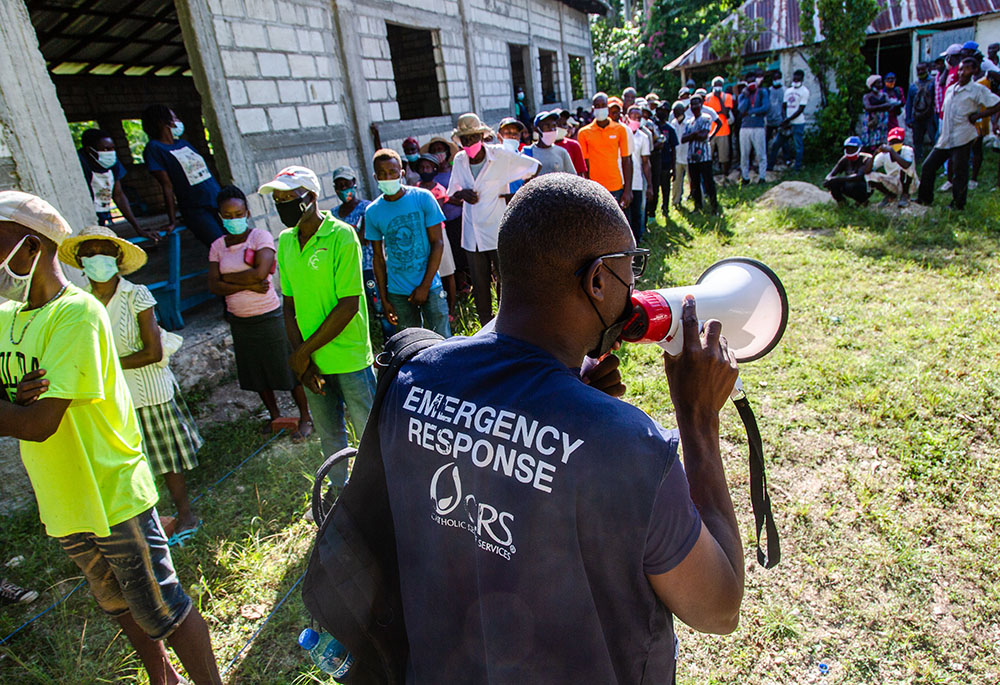
Haitians affected by the August 2021 earthquake in southern Haiti are seen in September at a Catholic Relief Services distribution site in the locality of Kay Raymond, Petit-Trou-de-Nippes, Haiti. (Catholic Relief Services/Georges Harry Rouzier)
At the same time, this worker believes strongly that any solution to solve the problems facing Haiti must come from Haitians themselves — something that non-Haitian sisters working alongside Haitian colleagues strongly support.
"We offer you our solidarity, through our hope and through our prayer, because in a way there are certain things that we can't do, I can't do as an American," Farnan said during the interview with Colapietro and her Haitian colleagues.
One thing that Americans can do is to support small-scale efforts that empower Haitians at the community level, such as providing clean water, said Ursuline Sr. Larraine Lauter, the executive director of the Kentucky-based ministry Water With Blessings.
Americans also need to stop equating the entire population of Haiti with violence, she said. Lauter sees an achingly frustrating situation in which 3,000 gang members who are "over-armed" are holding a country of 12 million hostage.
That leads to perceptions in the United States, she said, that "Haitians are some kind of bad people." Not true, she said. "Haitians themselves are like any other population: the vast majority are good and intelligent people."
Those Lauter works with in Haiti "go through tremendous challenges and risk to serve their fellow Haitian and the vast majority of the people they are serving are not turning to crime, turning to predatory activity."
She added: "It's almost a demeaning assumption to say, 'Well, if you're poor, you are justified in being criminal, you're justified in criminal activity and we should understand.' It's really demeaning."
Lauter's Haitian colleague, Gerry Delaquis, Water With Blessings' Haiti country coordinator, agrees, adding: "Give Haitians the chance to do the work — let them do it. Let Haitians make their decisions."
Both Delaquis and Larraine point to continued success of their organization's programs in Haiti they say have equipped numerous communities to access clean drinking water, including areas still recovering from the August earthquake.
If those are little-reported points of pride, it is because the security situation in Haiti remains dire and unsolved.
All rests on changing that, observers say.
"Unless peace or stability is established, nothing else is going to get done," Colapietro said. And yet each part of what ails Haiti — security, the economy, politics — is intimately tied to the other parts.
"Unless you deal with the full breadth of each piece of the system that's broken," she said, "one piece can just unravel the whole effort."





